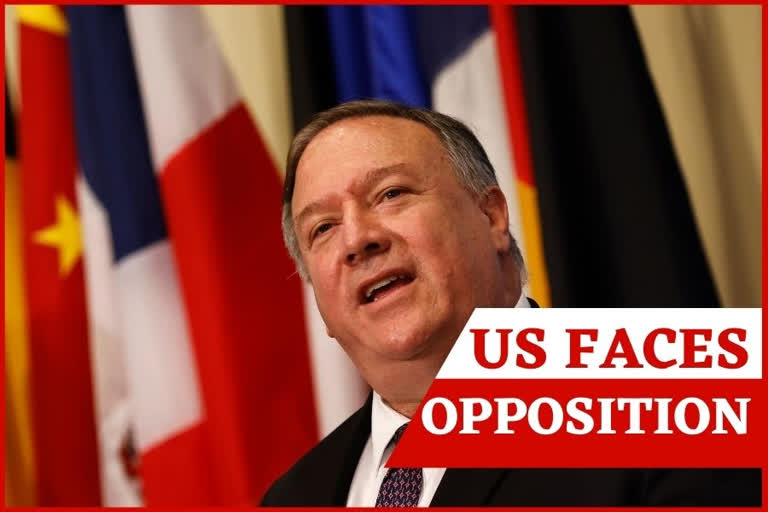United Nations:The Trump administration ran into immediate opposition after its top diplomat officially informed the United Nations it is demanding the restoration of all UN sanctions on Iran, with allies and opponents declaring the US action illegal and doomed to failure.
US Secretary of State Mike Pompeo insisted on Thursday that the United States has the legal right to 'snap back' UN sanctions even though President Donald Trump pulled out of the 2015 nuclear deal between Iran and six major powers that were endorsed by the UN Security Council.
Russia and China, along with European allies Britain, France and Germany, who often disagree, are united in declaring the US action 'illegal' on grounds that you can’t withdraw from a deal and then use the resolution that endorsed it to re-impose sanctions.
How this dispute plays out in the weeks ahead remains to be seen, but Thursday’s US move set the stage for a showdown in the United Nations that could lead to a crisis of credibility for the Security Council, its most important and powerful body.
Pompeo came to the UN to deliver a letter to Indonesia’s ambassador to the UN, Dian Triansyah Djani, whose country currently holds the rotating council presidency. It cited significant Iranian violations of the 2015 Joint Comprehensive Plan of Action, or JCPOA, a requirement to 'snap back' UN sanctions.
Pompeo said his message was simple: “The United States will never allow the world’s largest state sponsor of terrorism to freely buy and sell planes, tanks, missiles, and other kinds of conventional weapons ... (or) to have a nuclear weapon.”
And he said UN sanctions will continue the arms embargo on Iran, set to expire on October 18, as well as prohibit ballistic missile testing and nuclear enrichment that could lead to a nuclear weapons program which Tehran insists it is not pursuing.
Pompeo was sharply critical of 'our friends in Germany, France and the United Kingdom' who didn’t support a US resolution to indefinitely extend the arms embargo on Iran, which was resoundingly defeated a week ago.
Read more:Pakistan rakes up issue of Jammu and Kashmir at United Nations
He accused them of privately agreeing with the US but lacking the courage to say so publicly and proposing “no alternatives.”
“Instead they chose to side with ayatollahs,” Pompeo said. “Their actions endanger the people of Iraq, of Yemen, of Lebanon, of Syria and indeed their own citizens as well.”
Following Pompeo’s half-hour meeting, the council president began one-on-one consultations with its 14 other members on the legality of the US action, council diplomats said, speaking on condition of anonymity because discussions were private.
Under the terms of the Security Council resolution that enshrined the nuclear deal, Thursday’s notification starts a 30-day clock after which pre-2015 UN sanctions on Iran that were eased will be re-imposed unless a resolution specifically extending their suspension is passed. The US, however, would use its veto power to block any resolution extending the sanctions relief.
Pompeo said a Security Council resolution will be introduced as required, but he wouldn’t say which country would initiate it. Only the Dominican Republic supported last week's defeated US resolution to extend the arms embargo.
He appeared confident the UN sanctions would be re-imposed in 31 days and indicated that the US may impose sanctions on countries that don't enforce them.
Diplomats said the likely outcome of the council president’s consultations is that the majority of members inform him that the US is not legally entitled to invoke “snap back,” and therefore they consider that “snap back” has not been triggered and the US action will have no effect.
